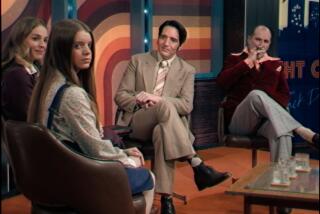‘Hell’ by Robert Olen Butler
If you must have a shtick, make it a good one. Robert Olen Butler is familiar with this dictum: His collection “Tabloid Dreams” was based on supermarket tabloids; the stories in “Had a Good Time” were drawn from vintage postcards; “Severance” was composed of 240-word pieces about the dying thoughts of the decapitated; and last year’s “Intercourse” imagined the inner monologues of 50 famous couples as they had sex.
Butler’s new novel, “Hell,” is a darkly comic work built around another high concept: the afterlife of Hatcher McCord, a news presenter marooned in hell. There, he encounters a who’s who of the historic and famous as well as endless numbers of common folks. His ex-wives, of course, are also there.
Even in the underworld, McCord is still a newscaster, unfurling Satan’s decrees and taunts. He conducts interviews with the prominent residents, asking only one question: Why do you think you’re here?
There is no torment spared in Butler’s vision of hell. McCord’s viewers are forced to watch commercials hawking “all the stuff they ever owned in their mortal life, one piece at a time, but the toll-free order number turns out to be a litany of their childhood sorrows.” Daily rains of hellfire obliterate anyone caught out in the streets, though bodies eventually reconstitute.
Pleasure is impossible, and some of the book’s most affecting moments involve the tragicomic scenes in which McCord and his live-in girlfriend, Anne Boleyn, head sometimes attached, attempt to consummate their affection.
After a successful interview with Satan, McCord receives a powder blue tie, which marks him as one of the big guy’s henchmen. His new privileges give him access to J. Edgar Hoover -- who keeps files on all of hell’s denizens -- and to a chauffeur, a fellow named Dick Nixon.
But the interview reveals the possibility that Satan is not omniscient and that McCord’s thoughts may be immune to his eavesdropping. McCord then embarks on a farcical, whirling journey, coming in contact with many of hell’s most famous residents while trying to answer some vital questions: Is all humanity here? Why? And is there a way out?
There are also whispers of a second Harrowing, in which Jesus will take the righteous up to heaven, and rumors that Dante -- yes, he’s there too -- knows a way out of hell.
Butler’s wit can be devastating. He delights in inventing new tortures for his characters as well as lampooning historical figures.
Humphrey Bogart, as debonair and noirish as ever, is distraught when the woman he pursues turns out to be Dante’s Beatrice instead of Lauren Bacall; William Randolph Hearst is reduced to a weeping blogger, as “keeping up with advances in technology is one of the great tortures of Hell for the old-timers.”
Then there’s his sketch of Bobby Fischer: “[T]hough always playing white, [he] is mated for the thousandth straight time by a chess-playing computer named Hadassah.”
As the novel progresses, however, these flourishes often end up serving as a substitute for plot. Each time McCord stumbles -- disparaged by an ex-wife or lost among the byzantine roads of hell’s metropolis -- we’re offered another prominent cameo, sometimes involving people who are not yet dead. Look, it’s Christopher Hitchens kissing Mother Teresa. Here’s Jefferson Davis, dressed in drag, fending off advances from a bloodstained Abe Lincoln. Even George W. Bush makes an appearance, predictably juvenile and semi-literate.
Then there is the wearisome episode in which Butler goes after Nick Denton, owner of the website Gawker, which savaged the author when his wife left him for Ted Turner in 2007.
Though the Denton character is only identified as “Nick Mineisbigger,” he is clearly a stand-in, and the epithets applied to him -- “the Cyberspace Sultan of Self-Righteousness, the Swami of Superiority, the Parasite of Prominence” -- are snark, not wit.
It’s unfortunate that Butler can’t keep his impulses in check because beneath the undergrowth of endless guest spots, there are some adroit insights.
If he dialed down the gimmickry and histrionics, his sense of clarity and pathos could stand on its own -- and we’d still have room to laugh at the absurdity of it all.
Silverman is a contributing online editor to Virginia Quarterly Review.
More to Read
The biggest entertainment stories
Get our big stories about Hollywood, film, television, music, arts, culture and more right in your inbox as soon as they publish.
You may occasionally receive promotional content from the Los Angeles Times.






